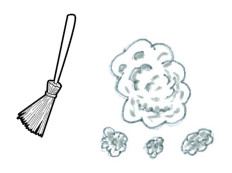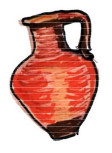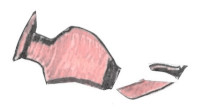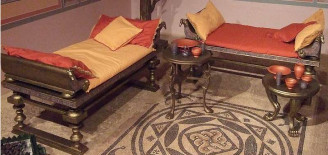

THE STORY OF
DINAH
“Mother, does God love everybody?”

“Of course, dear.”
“But does he love everybody the same?”
“Of course, dear.”
“But does he love Junos and Cronus?”
“Of course, dear.”
“But they aren’t Jewish!”
Sometimes Dinah drove her mother crazy with questions. Dinah’s head was filled with questions, and no one would take her seriously because she was a girl. Girls in the first century weren’t supposed to think. Girls were supposed to cook and sew and raise children and say, “Of course, dear.”
Because she was a girl, she wasn’t allowed to go to school and learn like her older brothers. But Dinah liked to think, and she had thousands of questions.

Dinah got up from her sewing and went to the back courtyard. She had questions and she wanted answers. But she didn’t know where to find them.
She went back into the house to talk with Junos. She wasn’t much older, but she knew so many more things. Junos was Roman and believed there were many gods, and she knew what to do to keep them happy. Maybe Junos would know the answer.

She found Junos sweeping out the living area and dust was flying everywhere. “Junos, I have a question.”
“Not right now, little one. I’ve got to get this room cleaned before your father brings guests home tonight. Later.”
It was middle of the afternoon before Dinah caught Junos making bread and free to answer her question. “Junos, does God love everybody?”
“Well, different gods love different things. Let me think. I’m not sure that the gods love anybody except themselves. I mean, they don’t love people — they expect us to love them. Is that what you are asking?”
“No. But that’s an interesting thought. Thanks.”
Dinah slipped off her stool and went back outside to think some more. Now she had even more questions. She had been taught that God loved her, but Junos said that her gods didn’t love people. That was curious.
She wondered if her Abba would know the answer. But she knew he would tell her not to worry her little-girl-head with questions. What she really wanted to know wasn’t whether God loved people other than Jews — she already knew that he didn’t, or at least that’s what she had been taught.
What she really wanted to know was if God loved some Jews more than others and ... would God still love her even if she disobeyed him. And she didn’t know quite how to ask that question without getting into a lot of trouble.
You see, it all started about a month ago with a simple trip to the well with Junos. They had filled their water jars and then Dinah had asked Junos if she could stay and talk with her cousin Abigail for a while. So, Junos had allowed her to stay at the well. But when Abigail left, another girl had come to draw water from the well and Dinah had said hello. She learned that the girl’s name was Naomi. They began talking, and ever since that “hello,” Dinah’s questions had multiplied.
Dinah and Naomi both discovered worlds they never knew existed. Dinah learned that some Jewish families didn’t have enough food to eat, and some slept outdoors. She was shocked to learn that some Jewish girls her age were sold into slavery. Naomi learned that some Jewish girls had closets full of clothes and actually slept in beds and had servants to take care of all their needs.
For the past few weeks, Dinah had been slipping out of bed much earlier than the rest of her family and going to the well to meet Naomi. She always took a water jar so that she could pretend she was just “helping” Junos.

She knew that slipping out of the house and talking to Naomi was not honoring her parents’ wishes. So, there was that question again: Will God quit loving me if I am disobedient? And why is it wrong for me to be friends with a person who is a fellow Jew, but who happens to not be rich?
Naomi was not only Jewish, but Dinah felt that she was more careful and thorough in following God’s Law than she was. Yet, Naomi was poor. Does God love rich people more than he loves poor people? And why?
Dinah thought that as she grew up, she would get answers to her questions, but she was discovering that the more she grew, the more questions she had.
Then last Wednesday, she had arrived at the well and found Naomi crying. Dinah rushed to her friend, calling, “Naomi, what’s wrong? Are you hurt? What’s going on?”

Naomi pointed to the pieces of what was left of her water jar.
“What happened? Oh, Naomi, don’t cry. Your mother will just buy another one. She’ll understand. Don’t cry. And are you hurt? Your knee looks scraped.” Dinah was trying to be helpful.
Naomi looked at Dinah in disbelief. “You don’t understand! There’s no money to buy another jar. This is our water jar. I have broken it. I don’t know what will happen.”
Dinah just sat and looked at her in silence. She let her mind try to comprehend a world like that. She thought of the shelf in her kitchen where there were 10 or 12 water jars just sitting and collecting dust.
“Here,” she said, “take my water jar.”
“Oh, no. I couldn’t take yours,” whispered Naomi.
“Then I will ‘accidentally’ forget my jar and you can take it,” said Dinah.
“Oh, no! That would be stealing. I would never steal someone else’s jar.”
“Then you will have to accept it as a gift from me. You are my friend, and I will tell Junos that I fell and broke my jar.”
“Dinah, that would be lying! I will not let you lie in order to help me.”
“Naomi, you are my friend and I want you to have this water jar. Your family needs it. If Junos misses it, I will tell her the truth.”
Naomi was such a good friend, and they had discussed Dinah’s questions of whether God loved all Jews the same and whether his love changed if they were disobedient. Naomi felt that God’s love was secure, but she still wanted Dinah to obey God’s Law.
She wasn’t sure whether it was okay to accept Dinah’s gift. They discussed all the pros and cons and lost track of time.
Suddenly, Dinah realized that she would be missed at home. She pushed the jar into Naomi’s hands and ran home as quickly as possible.
“And where have you been so early this morning?” Junos greeted her at the door as she entered the kitchen.
“I went to the well and got busy talking — you know how I like to ask questions! I just lost track of the time.”
“You went to the well? Where is your water jar?” asked Junos.
(Can you hear the sinister music playing in the background?) Caught! Now what?
Dinah took a deep breath, and in that moment, she knew that she wanted to tell the truth and quit hiding her friendship with Naomi.
“Junos, I gave my water jar to a friend who broke hers. Was that a terrible thing to do?” And with that Dinah burst into tears.
“I think it was a very kind thing to do, but why would she need your water jar? Couldn’t she just go home and get another one?”
“That’s the problem, Junos. She couldn’t. In the first place, she doesn’t have a home. And her family doesn’t have enough money for a new water jar.”
“Did she ask you for your water jar?”
“Of course not. She did not want to take it, but I insisted.”
“Dinah, you know that I will have to tell your mother.”
“Yes, Junos, I know. I hope that she will not make me give up my friendship.”
“So, you admit that you have made a friend that your mother will not approve of?”
“Yes, Junos.”
“What kind of girl is this?”
“She’s Jewish. She loves God very much and she obeys his Law and she insisted that I tell you the truth and not lie to you. She’s a good friend, but she and her family are very poor. In fact, if her Abba doesn’t get well soon, she and her entire family will be sold into slavery to pay their debts.”
Junos’ eyes softened as she remembered when she was taken as a young girl and sold on the Roman slave auction because her dad could not pay his taxes.
Junos looked intently at Dinah, “Give me time to think. Eat your breakfast and go to your room. I’ll speak with your mother about it. You know that I have to tell her.”
“Yes, Junos, I know.” She slowly ate her breakfast and had just arrived in her room when her mother came in. Dinah could tell from the look on her face that her mother was not happy.

“Dinah, Dinah, what am I going to do with you? What do you have to say for yourself?”
“Mother, I gave my water jar to Naomi because she broke hers. I thought it would be the kind thing to do. I was only trying to be helpful.”
“Dinah, you know good and well that that is not the problem! Who is Naomi? Who are her parents? Is she the right kind of young lady for you to be friends with?”
“She is Jewish, and she follows God’s Law. I have not met her parents,” replied Dinah.
But Mother continued, “Junos tells me that her Abba is sick, and they are poor and homeless. How do you think that looks for you to be friends with such a person?”
“Mother, doesn’t God love all Jews?”
“Dinah, don’t start that with me. I’m tired of your questions. You know that you disobeyed. You will not leave this house unsupervised again. You are getting too old to be allowed to wander around like a heathen (someone who doesn’t believe in God). Until you are safely married, you will be chaperoned at all times. Do you understand?”
“Yes, Mother, I understand.” Dinah was determined to not cry. Even if she never saw Naomi again, at least her family had a good water jar!
She wondered if she would be allowed to go to the well with Junos. Maybe she could at least wave at Naomi. But Dinah decided that she would not disobey her parents again. It was wrong and she knew that God was not pleased with it.
Her mother worked quickly and by mid-afternoon had secured a Jewish servant named Yavonna who would be Dinah’s personal attendant (and watch dog). She had supervised several young women in the area and came with excellent references.

To Dinah’s great delight, she discovered that Yavonna was quick-witted and an excellent debater. The afternoon passed quickly as they got acquainted. Yavonna helped Dinah choose a dress for the dinner party that her Abba was giving that night.
Dinah loved the parties that her parents hosted on most Sabbath evenings. It gave her a chance to meet new people and to learn new things. Her Abba, Simon, was a Pharisee and so invited other Pharisees and their families.
Pharisees were the spiritual and political leaders of Israel. After the women and children had gone home, the men usually stayed and talked about the political situation. They didn’t know that Dinah stayed up, hid and listened. She wondered if that was another thing that would make God not love her. Maybe secretly listening is disobeying. Oh, all this thinking makes my head hurt. I need to get ready for dinner.
Yavonna filled a pan of water and helped Dinah refresh her face and smooth back her dark hair. She seemed more like a friend than a servant and that made Dinah happy.
She discovered that they were eating in the front courtyard. The front courtyard was used for larger crowds and more important people so that everyone in town could see who the guests were and what they were serving. It was exciting to be surrounded by people watching — like being a princess.
The servants were busy seating guests, and because it was so hot, there were servants everywhere waving giant palm leaves to keep the guests cool.
She wished she could be seated at the main table with her Abba and his special guests. When she was little, she used to hide under the main table to hear what was being said. But now that she was 10, she had to settle for a table of girls near the center. Oh, well, she thought. Maybe I can get a better view from here.

Dinah reclined on what looked like a low couch. The “head” end was pushed up to the table and Yavonna stood behind her. Several of the other girls also had attendants.
The girls were jabbering on and on about clothes, and sewing, and cooking, and certainly about getting good husbands.
Dinah found her mind still thinking about her questions. Her heart was wondering what would become of Naomi and whether her family had enough to eat. The question just kept pounding in her head: Does God love all Jews — or just some of them? Just look at this courtyard, she thought to herself, even it reflects a difference between Jews.
The main table was filled with Abba’s Pharisee friends. Around the table were the couches where each man would recline and eat from the table. They were dressed most elegantly and were certainly considered to be proper Jews.
Mother was reclined at her table with a group of the Pharisees’ wives. They were dressed perfectly and were showing off their jewelry and new robes. They talked of nothing but their children and grandchildren like good Jewish mothers.
The Pharisees’ children were reclined at two tables right in the middle between their parents — one for boys and one for girls.
All these tables for the important Pharisees, their wives, and children, were on a platform so that they were elevated above everyone else.
The other tables were placed in a circle around the center platform. These tables were for the guests who were not quite so important. Dinah’s mind demanded to know why there were “outer circle” people and “inner circle” people. They are all Jews. Why is there a difference?
Beyond that, there were the spectators. Most of them were also Jewish, yet they were not invited, and never would be. That reminded her of Naomi, and Dinah wondered again if she was okay.
Is God’s love like that? Does he love some Jewish people more than others? And why should it matter to God whether you were born rich or poor? And doesn’t he control that? When will I get answers? Or will I just grow up and become an “of course, dear”? She visibly shuddered at the thought.
As she looked around the room that evening, she noticed a young man reclining at one of the outside tables. She didn’t recognize him. He really wasn’t dressed properly. But there was something else about him that attracted her attention. She couldn’t take her eyes off of him.
Her mind began to race and ask questions. Why is he not dressed appropriately for such a fancy dinner? And why doesn’t he care that he’s not dressed up? Why does he look so comfortable and calm? He doesn’t look at all nervous like the other people in the courtyard.
There was something about him that made her feel that she could ask him any question in the world, and he would know the answer. How can that be? Most of her Abba’s friends acted like they knew everything about everything. This man was different. She couldn’t put her finger on it — except for the words “confident” and “peaceful.”
She turned to talk with the girl seated beside her and asked if she knew who he was. “He looks like a peasant to me,” she said with disdain.
Dinah knew that she couldn’t just stare at him all evening, but every chance she got, she turned to see what he was doing.
Once when she turned to look at him, Yavonna leaned down and whispered in her ear. “His name is Jesus and I’ll tell you about him later. Don’t keep staring, it’s not correct behavior for a young lady.” Dinah resented being told how to behave — but when her eyes met Yavonna’s, she knew that Yavonna was a friend who had information that she wanted desperately.
“Thank you, Yavonna,” she said, and she tried to keep her attention on her own table guests.
Jesus was apparently charming his table mates and making lively conversation. In fact, his table seemed to be doing more laughing and having more fun than anyone else in the courtyard. It was hard to not turn and look when his table erupted with genuine laughter.
At that moment Abigail, her cousin who had just turned 12, announced that her parents had chosen her husband and that she would be espoused (engaged to be married) soon. All the girls were discussing the lucky man and plans for the wedding.
Suddenly there was a deathly silence over the entire courtyard.
A woman in that town who lived a sinful life ... came there with an alabaster jar of perfume. As she stood behind him [Jesus] at his feet weeping, she began to wet his feet with her tears. Then she wiped them with her hair, kissed them and poured perfume on them.1
No one in the whole courtyard was breathing. Everyone was waiting to see what their host, Simon the Pharisee would do. Simon was horrified. First, he was horrified that one of his guests had been touched by this sinful woman. And secondly, he was horrified that Jesus did not seem horrified by it!
Then a strong but kind voice rose over the crowd as Jesus said,
... “Simon, I have something to tell you.”
“Tell me, teacher,” he said.2
... “Do you see this woman? I came into your house. You did not give me any water for my feet, but she wet my feet with her tears and wiped them with her hair. You did not give me a kiss, but this woman, from the time I entered, has not stopped kissing my feet. You did not put oil on my head, but she has poured perfume on my feet.”3
Then Jesus said to her, “Your sins are forgiven.”4
The party broke up pretty quickly after that. Everyone seemed to be upset. And for once, Dinah didn’t even consider hiding and listening to her Abba’s conversations. She was eager to get to her room and hear what Yavonna knew about Jesus.
Yavonna cautioned her to remain quiet until after Junos had turned down her bed and helped her change into her night clothes. Once Junos was gone and the door was closed, Yavonna told Dinah that she would try to answer any questions she might have.
“I have more questions than will fit into my head. It feels like it will explode. Where do I start? But I guess my most pressing question is, ‘Who was that man?’”
“That’s an excellent place to start, because once you figure that out, then all your other questions become easier. He is a prophet sent by God and I have been listening to him teach for almost a year now.
“I am a follower of Jesus. I keep it quiet so that I will be allowed to work here and answer your questions. If Jesus were just a prophet, that would be exciting and wonderful. But I personally believe that he is who he says he is: The Messiah.”
“The Messiah? Like the Messiah? The one everyone is waiting for?”
“Yes. Except there’s a problem. A lot of those who said they were waiting for him are not happy with him and don’t believe that he is the Messiah.”
“I’m confused. Either he is or he isn’t, right?”
“Yes.”
“And you believe that he is the Messiah?”
“Yes.”
“Why?”
“You saw him tonight. What did you think and feel?”
“I felt that he was wise and good and loving and caring. There was something about his eyes that made me feel safe. And he had an incredible sense of confidence — but it wasn’t cocky like my Abba’s friends. He was just confident. I couldn’t put my finger on it.
“And then there’s the way he treated that woman. If indeed he is the Messiah, it answered my question.”
“What question is that?”
“I’ve been wondering if God loved all Jews just the same — or whether there were different levels of Jews. And I’ve been wondering if God would still love me if I messed up and was disobedient to his rules.”
“And what do you think now?”
“I think that God loves all Jews regardless of whether they are rich or poor, and I think he was criticizing my Abba for treating people differently based on wealth.”
“You are quite a thinker! I’m so glad that God has sent me here to teach you.”
“Do you think God has sent you here?”
“I certainly do! When someone begins to ask questions about God and what he desires and wants, he answers. It may not be in the way we expect, but he always answers those prayers. He wants us to know him and know that he loves us.”

“That’s super cool!”
“I think it’s bed-time for a tired girl. This has been a long day and we’ve got plenty of time to answer the rest of your questions. But you need to promise me one thing. Don’t tell anyone that I’m a follower of Jesus or I will be asked to leave, and you will not learn the answers to your questions.”
“I promise. I’m so glad you came to help me, Yavonna. And boy, do I have a long list of questions for you!”
“Tomorrow, little one, tomorrow.”
________________
